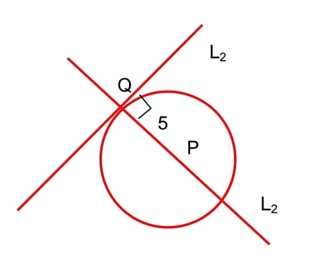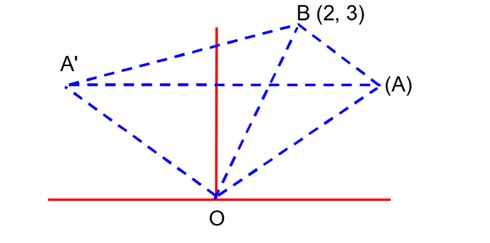Let a circle C of radius 5 lie below the x-axis. The line L1 : 4x + 3y + 2 = 0 passes through the centre P of the circle C and intersects the line L2 : 3x – 4y – 11 = 0 at Q. The line L2 touches C at the point Q. Then the distance of P from the line 5x – 12y + 51 = 0 is……….
Let a circle C of radius 5 lie below the x-axis. The line L1 : 4x + 3y + 2 = 0 passes through the centre P of the circle C and intersects the line L2 : 3x – 4y – 11 = 0 at Q. The line L2 touches C at the point Q. Then the distance of P from the line 5x – 12y + 51 = 0 is……….

Since circle C touches the line L2 at Q intersection point L1 and L2 is (1, -2)
P lies of L1
Now,
PQ = 5 ? (x – 1)2 +
The circle lies below the axis
y = -6
p (4, -6)
Now distance of P from 5x – 12 y + 51 = 0
Similar Questions for you
Let A, A’ be (, 2) AB and A’B subtends angle at (0, 0) slope of OA =
slope of OB =
now distance between A’A, (10, 2) &
Slope of AH = slope of BC =
slope of HC =
slope of BC × slope of HC = -1 p = 3 or 5
hence p = 3 is only possible value.
Let point P : (h, k)
Therefore according to question,
locus of P (h, k) is
Now intersection with x – axis are
Now intersection with y – axis are
Therefore are of the quadrilateral ABCD is =
Let equation of normal to x2 = y at Q (t, t2) is x + 2ty = t + 2t3
It passes through the point (1, -1) so, 2t3 + 3t – 1 = 0
Let f(t) = 2t3 + 3t – 1 f
Let P(1 – sin q, -1 + cos q) slope of normal = slope of CP Þ = tan q according to question ,
Þ g’(t) < 0 Þ g(t) is decreasing function in
Taking an Exam? Selecting a College?
Get authentic answers from experts, students and alumni that you won't find anywhere else.
On Shiksha, get access to
Learn more about...

Maths NCERT Exemplar Solutions Class 12th Chapter Ten 2025
View Exam DetailsMost viewed information
SummaryDidn't find the answer you were looking for?
Search from Shiksha's 1 lakh+ Topics
Ask Current Students, Alumni & our Experts
Have a question related to your career & education?
See what others like you are asking & answering

